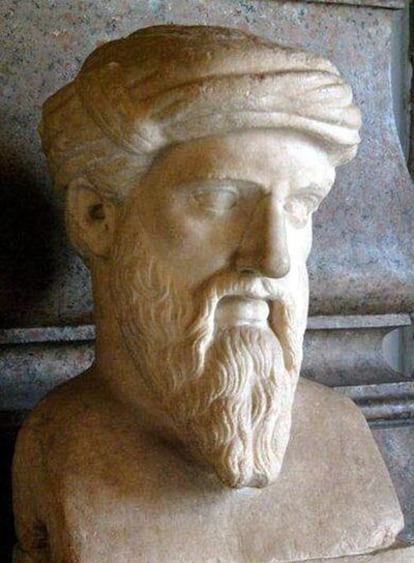How philosophy was saved thanks to a slaughter
The distinctive trait of Pythagoras' school was the absolute absence of dialogue
Ever since philosophy appeared (in the 6th century B.C.), it's fate has been insolubly linked to the operation of schools?not necessarily in the sense of buildings or shared spaces where philosophers would meet to discuss matters of their concern, but rather in the sense that any opinion on a given subject, no matter whose it might have been, could be challenged by somebody else, even though the later could well be - and usually, he was - a disciple of the former, provided that the potent disciple had spotted some kind of structural weakness to his teacher's approach, or in case he felt an innovative one was applicable.
For instance, when Thales, the father of philosophy, argued that the main and fundamental element of our world is water, Anaximander, his senior disciple, challenged his master's assumption by putting forth his own theory, according to which the main and fundamental element of the world is infinity. Thales and Anaximander were members of the school of Mellitus, the first school of philosophy ever. Ever since, numerous other schools have appeared such as, in antiquity, the ones of Ephesus and of Elea; the Atomics; Plato's Academy; the minor Socratic schools; the Lyceum; the Cynics; the Cyrenaics; the school of Epicurus; the Stoa; and the schools of Neo-Platonism. The Middle Ages and the Renaissance saw the creation of the school of Chartres; the Academy of Florence; and the schools of nominalism, of choisism, of Thomism, of Padua. Even later, the world of philosophy saw the rise of the school of rationalism and empiricism; the schools of neokantianism, of Hegelianism, of the common sense, of existentialism, of pragmatism, of intuitionism, of Frankfurt, and the one of phenomenology, as well as many others. Philosophy, from its birth until now, has been pacing along its never-ending path, which leads its way through schools, where the exchange of ideas - the dialogue - Is systematically cultivated.
Still, philosophy could well have become extinct from the very early years it emerged to the foreground, if the fate of one gifted Greek sage had been different. The person in question is Pythagoras. Born around 570 BC in Samos, Pythagoras was educated in Egypt and Babylon and went afterwards to Croton in Southern Italy, where he founded a philosophical school. The distinctive trait of Pythagoras' school?which offered a kind of education that was an amalgam of mysticism, religion and morals, on one hand, and mathematical exercise and scientific research on the other?was the absolute absence of dialogue. To become a member of this school, one had to first undergo a long period of silence, during which he had to learn to "keep his mouth shut." Next he had to listen to his master's - Pythagoras' - voice for five years without being permitted to see him; he was expected to accept aphorisms without demanding proofs. Finally, he was allowed to learn proofs?however not to dispute them, since such an endeavor would constitute a major insult to his master. Nobody was entitled to challenge Pythagoras' views. The saying that reputedly circulated within the community was "he said so," meaning Pythagoras, and thus nobody had any right to comment upon it. Given all these, how could this way of teaching - based solely on blind obedience and the interdiction of different views - be related to other schools, whose methods demanded that disciples exchange views and dispute opinions using arguments, even to the point of total deconstruction of their master's theories?
The very beginning of philosophy in Greece saw the confrontation of two diametrically opposed schools of thought: the one who resorts to esoteric meditation and was being cultivated among the Pythagoreans, and the other who uses dialectics, argumentation, and constantly refutable reflection; namely all other philosophical schools except the Pythagorean one. At the end of the day the latter trait prevailed. This way of reasoning is based upon dialectics.
To the outcome of this confrontation contributed a violent and possibly decisive event: the slaughter of the members of the school founded by Pythagoras in Croton. The inhabitants of Croton, afraid of the growing power acquired by Pythagoras' school and its members, descended upon them and slaughtered them, after setting fire to the building in which they had gathered.
One could claim?with as much certainty, of course, as such estimations on the evolution of things in history may permit?that the violent and abrupt ending that the inhabitants of Croton reserved for the school founded by Pythagoras, also decided the fate of the Pythagorean method. The Greek thought adopted dialectics as the most appropriate - and, sometimes, the only - way of dealing with philosophical issues. Due to that fact philosophy - as we know it today - was actually saved. However, the method of teaching proposed by Pythagoras eventually prevailed - in a different way - elsewhere. The silent, inarguable, and mystic meditation that interlaced throughout Pythagoras' teachings found fertile ground for evolving within the scope of Buddhism, Taoism, or Zoroastrism, which are the dominant spiritual currents in the East. Actually, Pythagoras is historically closer to Buddha, Lao-Tse and Zoroaster, since they all three lived in approximately the same era.
Professor Theodoris Pelegrinis, University of Athens. www.atomiumculture.eu

Tu suscripci¨®n se est¨¢ usando en otro dispositivo
?Quieres a?adir otro usuario a tu suscripci¨®n?
Si contin¨²as leyendo en este dispositivo, no se podr¨¢ leer en el otro.
FlechaTu suscripci¨®n se est¨¢ usando en otro dispositivo y solo puedes acceder a EL PA?S desde un dispositivo a la vez.
Si quieres compartir tu cuenta, cambia tu suscripci¨®n a la modalidad Premium, as¨ª podr¨¢s a?adir otro usuario. Cada uno acceder¨¢ con su propia cuenta de email, lo que os permitir¨¢ personalizar vuestra experiencia en EL PA?S.
?Tienes una suscripci¨®n de empresa? Accede aqu¨ª para contratar m¨¢s cuentas.
En el caso de no saber qui¨¦n est¨¢ usando tu cuenta, te recomendamos cambiar tu contrase?a aqu¨ª.
Si decides continuar compartiendo tu cuenta, este mensaje se mostrar¨¢ en tu dispositivo y en el de la otra persona que est¨¢ usando tu cuenta de forma indefinida, afectando a tu experiencia de lectura. Puedes consultar aqu¨ª los t¨¦rminos y condiciones de la suscripci¨®n digital.




























































